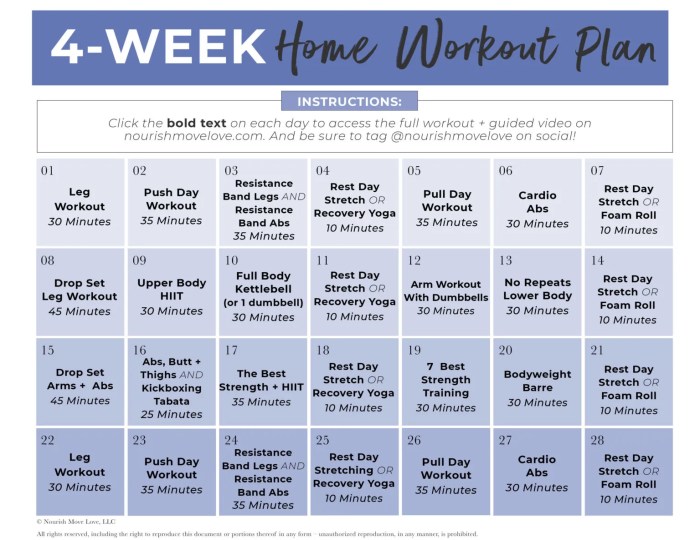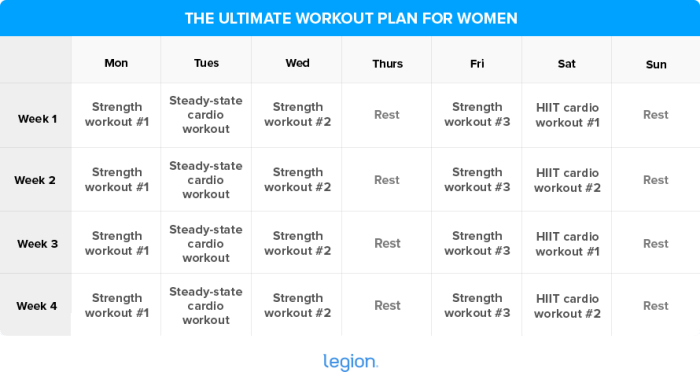Weight Training Program For Women: Forget the outdated notion that lifting weights will make you bulky. This comprehensive guide reveals how strength training can dramatically transform women’s health and well-being, boosting bone density, metabolism, and mental fortitude. We’ll explore safe and effective programs designed specifically for women, debunking common myths and providing actionable strategies for building strength, sculpting your physique, and achieving your fitness goals.
Prepare to discover the empowering potential of weight training.
From understanding the physiological and psychological benefits to crafting a personalized workout plan, we’ll cover everything from proper form and technique to nutrition and recovery. We’ll delve into the science behind muscle growth, explore effective exercises for all fitness levels, and address common concerns women have about weight training. This isn’t just about aesthetics; it’s about building a stronger, healthier, and more confident you.
Nutrition and Weight Training

Optimizing nutrition is paramount for women embarking on a weight training program. A well-structured diet fuels muscle growth, enhances recovery, and maximizes the benefits of strength training. Ignoring nutritional needs can hinder progress, leading to plateaus and potentially even injury. This section details the crucial role of nutrition in achieving weight training goals.
Macronutrient Requirements for Muscle Growth and Recovery
Protein, carbohydrates, and fats are the three macronutrients that provide the building blocks and energy needed for muscle growth and repair after intense workouts. Protein is essential for muscle protein synthesis, the process by which your body builds and repairs muscle tissue. Carbohydrates provide the energy needed for workouts and replenish glycogen stores, crucial for optimal performance. Fats are vital for hormone production, cell function, and nutrient absorption.
The ideal ratio of these macronutrients varies depending on individual factors like training intensity, body composition goals, and overall caloric needs, but a balanced approach is key. For example, a common recommendation is a higher protein intake (around 1.6-2.2 grams per kilogram of body weight) for individuals actively involved in weight training, coupled with sufficient carbohydrates for energy and fats for overall health.
Sample Meals and Snacks Supporting Weight Training
Consuming adequate protein, carbohydrates, and healthy fats throughout the day is crucial. Examples of meals supporting weight training goals include grilled chicken breast with quinoa and steamed broccoli (high protein, complex carbohydrates, and fiber), salmon with sweet potatoes and asparagus (healthy fats, complex carbohydrates, and micronutrients), and lentil soup with whole-grain bread (plant-based protein, fiber, and complex carbohydrates).
Snacks should be strategically timed around workouts. Good options include Greek yogurt with berries (protein and antioxidants), a protein shake with banana (fast-digesting protein and carbohydrates), or a handful of almonds (healthy fats and protein). These choices ensure consistent nutrient delivery to support muscle growth and recovery.
Hydration for Performance and Recovery
Adequate hydration is often overlooked but is crucial for optimal performance and recovery. Water is involved in numerous bodily functions, including temperature regulation, nutrient transport, and waste removal. Dehydration can impair muscle function, reduce strength, and increase the risk of injury. Aim to drink plenty of water throughout the day, especially before, during, and after workouts. Consider electrolyte drinks if you are engaging in prolonged or intense training sessions to replenish lost electrolytes.
The amount of water needed varies depending on factors such as climate, activity level, and individual sweat rate. Listening to your body’s thirst cues and monitoring urine color are good indicators of hydration status.
Sample Weekly Meal Plan, Weight Training Program For Women
This sample meal plan provides a framework; adjust portion sizes based on individual caloric needs and activity levels. Remember to consult a registered dietitian or nutritionist for personalized guidance.
- Monday: Breakfast: Oatmeal with berries and nuts; Lunch: Chicken salad sandwich on whole-wheat bread with a side salad; Dinner: Baked salmon with roasted vegetables.
- Tuesday: Breakfast: Greek yogurt with fruit and granola; Lunch: Leftover baked salmon and vegetables; Dinner: Lentil soup with whole-grain bread.
- Wednesday: Breakfast: Scrambled eggs with whole-wheat toast; Lunch: Turkey breast and avocado sandwich on whole-wheat bread; Dinner: Chicken stir-fry with brown rice.
- Thursday: Breakfast: Smoothie with protein powder, spinach, and banana; Lunch: Leftover chicken stir-fry; Dinner: Lean ground beef with sweet potato and green beans.
- Friday: Breakfast: Whole-wheat pancakes with fruit and a small amount of syrup; Lunch: Tuna salad with whole-wheat crackers; Dinner: Pizza with whole-wheat crust, lots of vegetables, and lean protein.
- Saturday: Breakfast: Omelet with vegetables and cheese; Lunch: Leftover pizza; Dinner: Chicken breast with quinoa and steamed broccoli.
- Sunday: Breakfast: Waffles with fruit and a small amount of syrup; Lunch: Leftover chicken breast and quinoa; Dinner: Vegetarian chili with cornbread.
Addressing Common Concerns: Weight Training Program For Women

Many women harbor misconceptions about weight training, fearing it will lead to excessive muscle bulk and a loss of femininity. These concerns often prevent them from reaping the numerous physical and mental health benefits associated with strength training. This section addresses these common anxieties and provides evidence-based information to dispel myths and encourage women to embrace weight training as a positive addition to their lives.
Addressing the Fear of Becoming “Bulky”
The notion that weight training will automatically make women excessively muscular is a significant misconception. Building significant muscle mass requires a dedicated, intense training regimen, often supplemented with specific nutritional strategies, including high-protein diets and tailored supplementation plans. For most women, weight training leads to a leaner, more toned physique, rather than an overly bulky appearance. The type of training matters; focusing on higher repetitions with lighter weights, coupled with a balanced diet, will promote muscle tone and definition without excessive bulk.
Hormonal differences also play a crucial role. Women naturally have lower levels of testosterone, the hormone primarily responsible for muscle growth, making it considerably more difficult to achieve the level of muscle mass seen in male bodybuilders.
The Importance of Overall Health and Well-being
While aesthetics play a role for some, prioritizing overall health and well-being should be paramount. Weight training improves bone density, reducing the risk of osteoporosis later in life. It boosts metabolism, aids in weight management, and enhances cardiovascular health. Moreover, strength training improves mood, reduces stress, and increases self-esteem, fostering a more positive self-image. Focusing on these holistic benefits, rather than solely on achieving a specific body shape, provides a more sustainable and rewarding approach to fitness.
Inspirational Stories of Women and Weight Training
Numerous women have successfully integrated weight training into their lives, transforming their physical and mental well-being. Consider the example of a former marathon runner who transitioned to weight training after suffering a knee injury. She initially feared gaining weight, but found that strength training helped her recover, increase her overall fitness level, and achieve a more balanced physique. Another example is a woman who began weight training to combat post-partum depression.
She discovered that the physical exertion and sense of accomplishment boosted her mood and helped her regain her confidence. These are not isolated incidents; countless women have found empowerment and improved health through weight training.
Resources for Further Information and Support
Gaining access to accurate and reliable information is crucial for women embarking on a weight training journey. The following resources can provide guidance and support:
- Certified Personal Trainers: A qualified personal trainer can create a tailored program, address individual concerns, and ensure proper form to prevent injuries.
- Registered Dietitians: A registered dietitian can provide guidance on nutrition, ensuring adequate protein intake and overall dietary balance to support muscle growth and recovery.
- Online Fitness Communities: Many online communities offer support and encouragement for women who are weight training. These forums can provide a sense of community and shared experience.
- Reputable Fitness Websites and Publications: Websites and magazines dedicated to fitness and women’s health can offer valuable information, exercise tips, and nutritional advice.
Embarking on a weight training journey is an investment in your overall health and well-being. This program empowers women to take control of their fitness, dispelling misconceptions and providing a clear path to achieving tangible results. By understanding the principles of progressive overload, prioritizing proper form, and fueling your body with the right nutrients, you can unlock significant physical and mental benefits.
Remember, consistency and a focus on progress, not perfection, are key to long-term success. Embrace the power of weight training and embark on a transformative experience.

